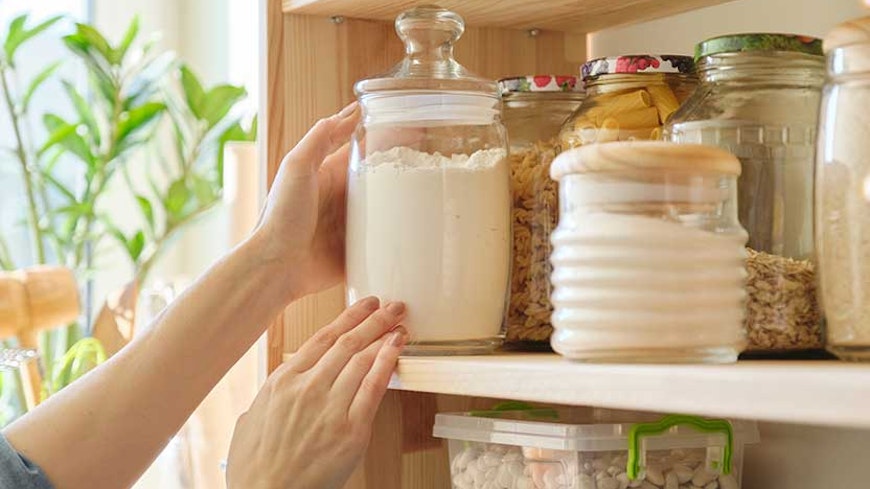
By Belinda Castles
Researcher | Kairangahau
Dealing with a bulging pantry? Here are our tips to get the longest life out of your cupboard staples and fresh produce.
Best-before and use-by dates: know the difference
Best-before dates give you information about food quality. Food can be eaten and sold after its best-before date. However, it may have lost some nutritional value and might not taste the best. If a food has a shelf-life of two or more years, it doesn’t need a best-before date.

Food can be eaten and sold after its best-before date, but it may have lost some nutritional value.
As soon as you open any food’s packaging, its shelf life becomes the same as if the product was unpackaged. How long it’s safe to eat depends on several factors: its water and protein content, quality when you bought it, and how it’s been stored. Here’s the shelf life of common refrigerated foods once opened.
Use-by dates are usually on perishable foods such as poultry and deli foods. A food can’t legally be sold after its use-by date and shouldn’t be eaten because it can make you sick.
Bread
Bread keeps the longest in the freezer (though it’s not as convenient, as you have to wait for it to defrost). If you’re a pantry-only fan, it should be kept in its packaging (paper or plastic if it’s homemade) and stored in a cool dry area– ideally in a bread tin if you have one. A good compromise is the middle shelf of the fridge, but it will still get stale as it dries out.
If your bread’s stale, whiz it in the food processor to make breadcrumbs, which you can then pop into a resealable container for freezing. You can use it to crumb meat and fish or add it to dishes (for example, meatballs or pasta bakes).
Tip: Freeze half your loaf and keep the other half out. The half in the freezer won’t get stale or mouldy.
Eggs
Eggs keep longer in the fridge but they can be stored at room temperature (as long as it’s 15°C or lower). Either way, store your eggs in their original carton: it keeps them safe from cracking, slows moisture loss, stops them absorbing other food smells and you’ll know the best-before date.
Tip: Check eggs are safe to eat with the float test. Place the egg in a bowl or cup of water. If the egg sinks, it’s good to eat. If it floats, throw it away.
Flour and dry ingredients

Store your flour and other dry ingredients in their own airtight container.
Store your flour in a large, airtight container that your measuring cup can fit in. A container with a screw-top is best, but any well-sealed lid will be fine. Transfer other dry ingredients (for example, baking powder and baking soda) that don’t come in resealable packets to an airtight container. Or use a resealing bag clip.
This help prevents weevils getting into your baking stash. Some people swear that adding a bay leaf will keep weevils away.
Pantry moths are sometimes lurking in your dry goods – sometimes in new purchases. Freezing the ingredients should kill the moths and any larvae. Wrap the goods in a plastic bag and freeze for two days, before then storing in an airtight container.
Sugar
Sugar should be stored in an airtight container in a cool, dry place. It shouldn’t be kept in the fridge because this exposes it to moisture, which can make it go hard.
Sugar doesn’t have a best-before date because it doesn’t grow mould.
Cooking oil
Heat and light affect oil quality, so store your oil, tightly stoppered, in a cool, dark place. Don’t buy clear bottles, especially ones that have been displayed in a shop window or under fluorescent light.
For olive oil, buy the freshest oil possible. Look for the most recent “pressed on” or harvest date you can find.
Canned food
If a canned food has a shelf life of two years or more, it doesn’t need a best-before date. As long as it’s been stored and sealed properly, it should last several years. However, if you can see any signs of deterioration, such as rust, don’t eat the contents.
Bananas
The best way of extending the life of your bananas is by keeping them separate from other fruit, such as apples and pears. These fruit (as well as bananas) produce ethylene, which speeds up the ripening process.

Bananas, apples and pears produce ethylene which speeds up the ripening process.
Tip: Separate each banana and wrap the stem in plastic – this stops the release of ethylene that cause ripening.
If your bananas are too ripe to eat, peel and chop them into slices for freezing. If you have plenty, freeze them first in a single layer on a lined tray before putting them into bags or containers (this stops them sticking together in large clumps). Frozen pieces can be used in smoothies or defrosted to bake into banana bread, pancakes or muffins.
Bananas can be frozen whole, but you’ll need to defrost them first before you can peel them.
Tomatoes
Tomatoes lose flavour in the fridge so are best kept in a bowl. They are sensitive to ethylene (the gas that quickens ripening) so keep them separate from other fruits such as bananas, apples and pears.
Riper tomatoes are delicious roasted. Slice and spread on a baking tray with a little oil and herbs. Roast at 180°C for 15 to 20 minutes for smaller tomatoes, or about 45 minutes for larger ones. To make a simple pasta sauce, blitz roasted tomatoes with a hand-held blender or food processor.
Tip: The pasta sauce can be frozen to be used for a quick and easy dinner.
Apples
Apples last longer in the fridge, so if you prefer eating them at room temperature, move a few from the fridge to the fruit bowl each day.
Apple doesn’t freeze well. But you can stew it, then freeze it. Alternatively, use extra apples in coleslaw.
Tip: Making stewed apple – chop into pieces, then add to a saucepan with enough water to cover the apples. You can also add a little bit of sugar or lemon juice if your apples are too sweet or tart. Bring to the boil and simmer for 10 to 15 minutes or until the apple is cooked and pulpy.
Avocados
Ripe uncut avocados can be refrigerated for a few days. Once cut, store in an airtight container or cover with lemon juice to stop them browning. If you have loads, puree with lemon juice and freeze for use as future guacamole.
To speed up the ripening process, pop your avos in a bag with an apple or banana.

We can't do this without you.
Consumer NZ is independent and not-for-profit. To help us get a fairer deal for all New Zealand consumers, you can make a donation. We’ll use your contribution to investigate consumer issues and work for positive change.